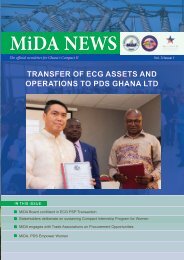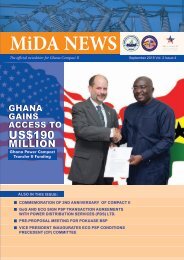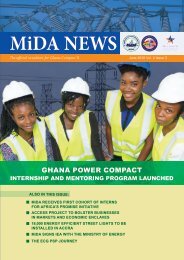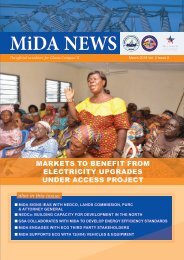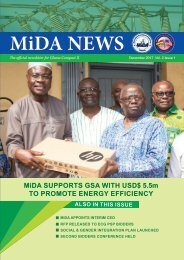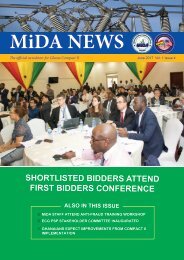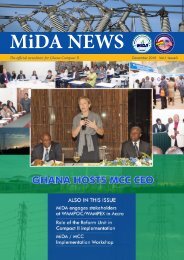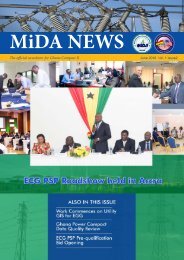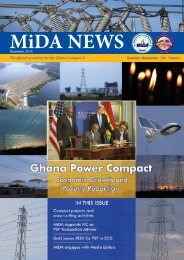MiDA News - maiden edition
The official newsletter for the Ghana Compact II
The official newsletter for the Ghana Compact II
Create successful ePaper yourself
Turn your PDF publications into a flip-book with our unique Google optimized e-Paper software.
Millennium Development Authority<br />
Quarterly <strong>News</strong>letter Vol. 1<br />
Ing OKS: I would say the biggest success is<br />
forming a team. We started with just myself. Now, we<br />
already have 53 people on board and I think we get on<br />
fairly well. We have begun to work around teams, we<br />
understand each other well, and we know where we are<br />
going. I think that it is the beginning of great things to<br />
happen.<br />
MN: And the biggest challenge?<br />
Ing OKS:The biggest challenge has to do with time. I<br />
want quick results and sometimes I haven’t seen the results<br />
as quickly as I wish I could have them. That’s because<br />
you need to go through certain protocols and certain<br />
procedures and all these take time. I must say that<br />
things are not happening as fast as I would want them;<br />
nevertheless things are getting on.<br />
MN: Broadly, what would you say is your vision for<br />
this Compact?<br />
Ing OKS: The vision for the Compact is very<br />
clear. What we intend to achieve in the Compact is<br />
basically what my vision is. We are hoping that <strong>MiDA</strong>,<br />
as an organization, will be a primary agent or one of the<br />
key agents [in Ghana] for poverty reduction through<br />
private sector led interventions. My vision is that we<br />
will be able to achieve this intention. That we will be<br />
able to achieve our programme objectives within the<br />
constraints that have been stated. That we will achieve<br />
the targets we’ve set around these objectives.<br />
Also at the end of it all, I expect that all of us, i.e. staff<br />
would have grown. I think that when you achieve<br />
targets and you work within an organization you will<br />
have to grow and so I am hoping that having done<br />
everything, our staff should also benefit and the main<br />
benefit that staff would have is that they should grow<br />
tremendously. If we accomplish all the projects, we<br />
meet all the deadlines, and work within the fiscal<br />
regimes that we are working with and in everything<br />
we are mechanical, in the sense that staff really do not<br />
grow, then I think that we would not have achieved<br />
what we set out to do.<br />
MN: One of the things that makes this Compact<br />
difficult is that it doesn’t have tangible<br />
infrastructure. We can’t see the impacts as we may<br />
have with the first Compact. What should we look<br />
out for to help us recognise the changes coming with<br />
Compact II?<br />
Ing OKS: That is very true and that concerns me,<br />
because Ghanaians like to see physical items; power<br />
plants, substations, transmission lines, etc. What would<br />
help is that we need to tell our story. We need to blow<br />
our own horn as the saying goes. In many Ghanaian<br />
cultures they say that if you don’t blow your own horn,<br />
nobody will blow your horn for you. Communication<br />
is going to be very key, we need to be able to tell our<br />
story so that we continue to be a major influencer, so<br />
people can see the impact that we are making. In addition<br />
to that, for the projects, which are infrastructure projects,<br />
we need to structure them and roll them out in such a<br />
manner that as soon as possible we can have things<br />
on the ground that we can point to. I think that if we<br />
do these two things then we would have achieved the<br />
intentions for which we set out.<br />
MN: Do you have any concerns about our ability to<br />
achieve the targets?<br />
Ing. OKS:The Compact requires a lot of collaboration<br />
and sometimes I’m not too sure whether we are<br />
getting the kind of collaboration that it requires. It<br />
requires collaboration with government, and with<br />
private entities, particularly the reform components.<br />
Whether you are talking about reforms in the distribution<br />
sector, or you are talking about reform of the regulation<br />
or reforms of other areas. All these require a lot of<br />
collaboration and a lot of hard work and we need to<br />
build teams and networks such that we can achieve<br />
these results. Sometimes it is difficult to see results<br />
in this area. That is the concern that sometimes I have<br />
which then means that we all have to work hard.<br />
MN: What would be your first words to staff as we<br />
prepare to Enter into Force in 2016?<br />
Ing OKS: I think that my first words to staff will be,<br />
“welcome on board everyone.. We have a mission and<br />
all of us should strive to achieve that mission.” I think<br />
that we have staff who are imbued with a lot of talents.<br />
We have staff who are good, staff who have a track<br />
record and so we should work together to achieve the<br />
vision that we have set for ourselves. Staff should know<br />
that in spite of the hurdles ahead of us, the things we<br />
have set out to do are doable, and that we can achieve<br />
the targets that we have set out to achieve if we work<br />
together. We want to create an environment which is<br />
conducive for work. A happy work environment. This<br />
is very important to me. I have always said that because<br />
we spend so much time at work, the work environment<br />
should be a happy environment. Otherwise, then we<br />
would end up with unhappy people all around us.<br />
MN: Thank you very much for your time. It’s been a<br />
pleasure talking to you.<br />
18




